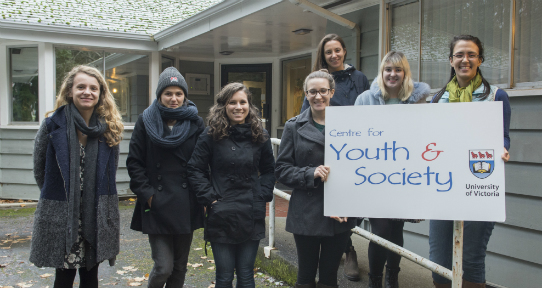Our mission

Mission statement
The Centre for Youth & Society aims to promote the well-being of youth from diverse social, economic, and ethnic backgrounds, across developmental transitions, and in evolving societal circumstances.
Guiding principles
We respectfully acknowledge the history, customs, and culture of the Lekwungen and WSÁNEC Nations, on whose traditional lands our Centre is located.
- Youth is a dynamic developmental phase that links childhood experiences and opportunities throughout adolescence and into early adulthood, typically the years between ages 12 and 25. Both normative and challenged developmental processes need to be understood
- Youth well-being is embedded in cultural contexts that encompass family, school, peer, community and societal influences. Our strength-based perspective recognizes that contexts promote resilience.
- Youth experiences are diverse. We focus attention on the strengths and contributions of youth to their families, school, and communities, and on youth who are vulnerable due to societal, family, and community challenges.
- Inter-disciplinary research perspectives and diverse methodologies are necessary to increase understanding and promotion of the well-being of youth.
- The Centre seeks to identify concerns of youth themselves and of society as a whole so that programs, research, and training priorities are responsive to those concerns.
- Our research emphasizes the generation and dissemination of knowledge concerning strengths, challenges, opportunities, and problems of youth and by youth.
- Youth expertise is recognized; we promote youth engagement in all aspects of formulating and disseminating research-based knowledge.
Goals
The core mandate of the Centre is to promote research and action that contribute to the well-being of youth.
Additionally, the goals of our research are to:
- Generate and disseminate research knowledge concerning strengths, challenges, opportunities, and problems of youth;
- Identify the concerns of youth themselves so that programs, research, and training priorities are responsive to these concerns;
- Advance inter-disciplinary community-based research on adolescent health and development;
- Train specialists in interdisciplinary community-based research, education, and health-care of adolescents;
- Advocate for youth with policy-makers and research funding agencies;
- Emphasize an ethical approach and scientific rigour.
